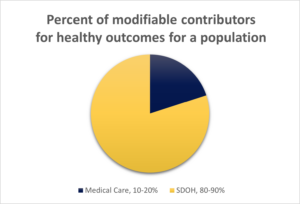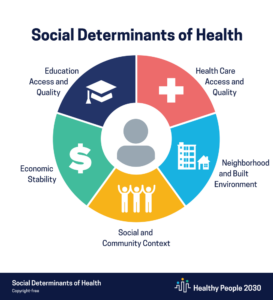Health Equity Matters Part 1
Social Determinants of Health (SDOH) have an even bigger impact on healthy outcomes than some of us could have ever imagined. A whopping 80-90% to be more exact. That’s right – medical care accounts for only 10-20% of modifiable contributors for healthy outcomes in a population. So how do we promote health equity in the medical field?
 The AMA estimates that the U.S. spends more than $3 trillion a year on health care and generates more data than ever before, but some of the most meaningful data are still inaccessible and incomplete.
The AMA estimates that the U.S. spends more than $3 trillion a year on health care and generates more data than ever before, but some of the most meaningful data are still inaccessible and incomplete.
We can help change that.
As the AMA continues to release new Z Codes related to SDOH, there’s more incentive for reimbursement to collect this type of information. But more importantly, contributing to SDOH data collection helps improve health outcomes. Join AQuity Solutions in making a bigger impact on our public health.
Whole Person Care = Better Patient Care
SDOH are now being more recognized as having a direct impact on health. According to a recent article titled: Healthy People 2030. SDOH are the conditions in peoples’ environments that affect a wide range of health, functioning, and quality-of-life outcomes and risks. The five domains of SDOH include:
- Economic Stability
- Education Access and Quality
- Health Care Access and Quality
- Neighborhood and Built Environment
- Social and Community Context
 Unmet social needs, such as food insecurity, housing instability, and transportation barriers, negatively impact health outcomes. For instance, people who don’t have access to healthy food are more likely to be at risk of heart disease, obesity, and diabetes.
Unmet social needs, such as food insecurity, housing instability, and transportation barriers, negatively impact health outcomes. For instance, people who don’t have access to healthy food are more likely to be at risk of heart disease, obesity, and diabetes.
Collecting this type of data and how it’s impacting patient health brings the underlying issues to light where there can be more action taken to improve the conditions.
Where Z Codes Come into Play
Z Codes first became available in fiscal year 2016, but the Centers for Medicare & Medicaid Services reports that the codes were used for only 1.6% of Medicare fee-for-service beneficiaries in 2019.
This was due to unfamiliarity with the codes, viewing them as low priority, not having operational processes for documenting and coding, and a lack of clarity on who can document social needs. In 2018, the change was made where any clinician can document a patient’s social needs, whereas before coders could only report codes supported by physician documentation and not non-physician providers, such as case managers, discharge planners, social workers, and nurses.
As the importance around SDOH has grown, new Z Codes have been added, with a handful more added this year. According to AAPC, utilizing these codes means capturing information that significantly impacts patient care and health outcomes and helps to:
- Support evaluation and management (E/M) coding
- Justify medical necessity
- Paint a complete picture of the patient’s circumstances
- Identify potential barriers to diagnosis and treatment
- Gather data on treatment efficacy and the true cost of care
In addition to providing better patient care, Z Codes can also be used by providers to account for the impact SDOH has on clinical decision-making and bill for a higher level of complexity.
Let’s Build Health Equity Together
For such a large issue as health equity, it can feel difficult to make a drop in the bucket toward change. But a small step like properly using Z Codes can truly make a difference. It starts by making them a priority. They can no longer be an afterthought – everyone involved needs to understand the importance of screening, documenting, and coding patients’ social needs.
If you are facing challenges in implementing the use of Z Codes in your practice, AQuity is here to help. Our credentialed coders stay on top of the latest regulations and recommendations. They know exactly where to look to find direct documentation related to SDOH that may not be as easy to locate. We can ensure proper use of Z Codes, earning you improved justifiable reimbursements, all while collecting important data that impacts patient care and leads to better community resources for those experiencing health disparities.
Our mission is to help you provide better patient care, and that means whole person care. We look forward to helping improve health outcomes together.



